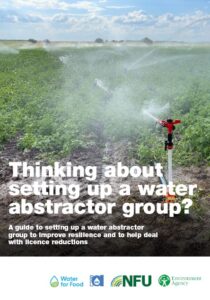WAG Directory
WAG directory
Information and contact details for Water Abstractor Groups (WAGs)
Thinking of starting a group? List your group here? Amend your listing?
Find out what other groups are doing
Get in touch contact m.kay@ukia.org
Why we need water abstractor groups
Over-abstraction, climate change and increasing vulnerability to drought are driving changes in how we manage water in England. To ensure sustainable abstraction in the future, the Environment Agency is taking steps to restore abstraction to sustainable levels. Abstraction licences may be reduced or revoked to ensure sustainability and this will no doubt be challenging for abstractors.
This booklet explains why abstractors need to pay much more attention to their abstraction licences and explore alternative water resource and management options to maintian production. One option is to form or join a Water Abstractor Group. Read/download this booklet
List of Water Abstractor Groups: information, news and contact details
Water Abstractor Groups
Cambridgeshire
Fenland Soils
Lark Abstractors Group (Cambridge & Suffolk) (evolving)
Thet Abstractors Group (evolving)
Herefordshire
Wye Water Abstractor Group (evolving)
Kent
South East Rivers Trust (emerging)
Thanet Water Abstraction Group (TWAG) (emerging)
Idle and Torn Abstractors
Lincolnshire North
Lincoln Water Transfer Ltd (mature)
Lincolnshire South
South Forty Foot Water Bank (evolving)
Norfolk
Norfolk Environment Food and Farming (Norfolk EFF) (originally BAWAG) (mature)
Wissey Abstractors Group (evolving)
Northumberland
Northumberland Agricultural Abstractors Group (NNAAG) (evolving)
Nottinghamshire
Nottingham Time-Limited Abstractors Group (Notts TLAG) (evolving)
Shropshire
Northern Shropshire Water Abstractor Group (emerging)
Suffolk
Would you benefit from forming a WAG?
Take the 5-minute quiz on page 5 of the booklet
Desired attributes for WAGs to emerge, evolve and mature
Attributes
Attributes needed for start-up Emerging
A dependence on irrigation for a sustainable farming business
Threat to livelihoods and increasing resource scarcity
A small number of key individuals who have the knowledge, skills and motivation, and
sufficient trust to form a group
People who take a medium- and long-term view
A feeling that it is possible to have increased influence in water management
Attributes important for a group to develop Evolving
A strong common interest in water resources amongst members
Clearly defined boundaries for both membership and water resource
Increasing understanding of the water resource characteristics and usage, and water
resources and farming issues
Demonstrating the benefits to members. A step-by-step approach and with low start-up costs
Benefits to members need to be in proportion to the costs imposed on them
Members have autonomy to devise their own institutions and rules
Improving openness and cooperation, which builds trust between members and working
relationships with water regulatory authority and other organisations, including
other irrigator groups
Attributes for a group to successfully manage water resources Mature
Adequate monitoring of the resource and users by users or those accountable to the users
Users who violate rules receive graduated sanctions depending on the seriousness of the offence
Users have access to low-cost local conflict resolution mechanisms solutions to resolve differences
Rules restricting water resource use are related to local conditions
Members can participate in rule modification within the group
A culture of openness and cooperation within the group and with external organisations promotes
good working relationships and collaboration
More information for abstractor groups
Taking control and responsibility for water: Farmers are the best people to manage water for agriculture
UKIA 2025 Conference presentations focused on WAGs and their issues
1,447 total views, 1 views today

